
views
Choosing a Subject

Choose a subject about which you're well informed. Ranting about an unfamiliar subject is a great way to embarrass yourself and may even inadvertently win points for the issue or topic you're trying to rail against. Only rant about things that you're already familiar with. It's usually a good idea to do a little research to back up and bolster your already-familiar experience with the topic or issue. Even if you think you're sure, make your rant air-tight with specific facts. Even if you think your opinion about an issue is iron-clad, try to make sure to bolster your strong opinion with facts, so your rant doesn't end up looking foolish. You may even end up becoming a passionate advocate for the other side, if you dig around in the issue.

Pick something with high stakes to rant against. The difference between a good rant and a whiney blog post has to do with stakes. If you're going to rant effectively, there needs to be some deeper issue or cause behind the thing that you're ranting against. There needs to be a reason to complain. Find it before you start complaining. The stakes of something like hydraulic fracking and mountain top removal mining may be obvious, but may be less obvious about what so-and-so wore to the red carpet. That doesn't mean you can't rant about both effectively, you've just got to dig a little deeper. Rants can be cultural, political, social, and address issues of class, race, sexuality, and any number of different topics. Find the serious issue behind the surface if you want your rant to go deeper.

List out the negatives. What really gets under your skin about that particular topic? Before you launch directly into your rant, it's a good idea to brainstorm a list of irritations from which you can build an effective rant. The more specific, the better. A personal story can lend a great amount of pathos to a rant. Do you have any personal experiences that could be used to your advantage? If you were recently stopped and frisked by a police officer for no reason, it might make your rant much more passionate to include the story. Stick with your subject until you find something serious at the center of it. So reality TV annoys you. So what? Stick with it until you find something more interesting.

Find a weak spot. When you rant, you want to direct your rant exactly where it will hurt the opposition. Don't shy away from contradictions, fallacies, and other failures of logic that you find in the subject you want to rant against. What is it that just doesn't make sense to you about your little irritation? If you can't stand the sitcom "Two and Half Men," you may instinctively want to say, "It's just stupid," but keep going to find the weak spot. Why is it stupid? What's stupid about it? How can you articulate the stupidity? You might decide that the show you hate presents stereotypical versions of men and women. Start looking for examples of this to back up your rant. Pick on them specifically and your rant will be super-strong.
Nailing the Tone

Use specific examples. Bad rants will list the same idea fifty times and won't prove a thing. You can tell us in a strongly worded way that "Two and a Half Men" is the worst show of all time because "it's stupid," or you can start showing us how and why it's so terrible. Every time you make a claim in your rant, get in the habit of asking yourself, "So what?" Then answer that question. Highlight contradictions or logical fallacies. The best way to rant is to skewer the topic at hand by pointing out all the ways in which it's completely wrong, ridiculous, or terrible. Connect the dots for us.

Use powerful adjectives. Bad rants will tell us that something is "really really really stupid" and good rants will tell us something more specific and accurate: "The so-called humor on 'Two and a Half Men' is so insipid and juvenile, it makes 'Beavis and Butthead' seem like beloved characters from Shakespeare. The show is colossally stupid." It's important to bolster your railing with specific examples. You can only tell us something is bad so much without bothering to prove it to us. Give us quotes, specific examples, and discuss the thing in as much detail as possible.

Use sarcasm to your advantage. Sarcasm is the ranter's playground. Make good use of verbal eye-rolls by ramping up the sarcasm and embarrassing the opposition. Your target will be sorry it ever raised your ire if you launch sarcasm bombs like this: "The creator of 'Two and a Half Men' says that the show is 'populist.' This is true. The show should get full credit for being so populist as to be the best show on television that appeals to the sexist, racist, dunderheaded caveman instincts in its knuckle-dragging audience."

Use irony and satire to your advantage. One great way of ranting against something and thoroughly skewering it in words is to mock it more subtly. If you can do an impression of your target and mock the style, you'll be a ranting pro. If you want to rant against the twee stylings of Wes Anderson movies, say, you might try writing in an overly cutesy way about the panda bear you had to care for at short film camp, and how you locked eyes with a Brazilian folk singer doing covers of Kinks songs on a thumb piano.

Embrace the big picture. Good rants make mountains out of molehills. Connect the small thing you're noticing and feel the need to rail against to a larger social, cultural, or political issue. If it bugs you when your friend checks Facebook every five seconds while you're trying to have lunch, what could this tell us about interpersonal relationships in the digital age? What's the end result of all this Facebooking? Where are we headed as a culture of heads-down phone-watchers? There's a fine line between an effective rant and a big exaggeration. You want to get as close as possible to it without going over. Saying that Facebook ruins dates and makes it more difficult to relate to one another, not easier, is right within the constraints of a good rant. Saying that Facebook is probably responsible for Ebola? That's a stretch.
Avoiding Common Mistakes

Let it sit before you make it public. Twitter and Tumblr make it easy to be completely unfiltered in a very public way. If you're going to rant hard on a subject that you feel passionately about, feel free to do it, but don't post it online until you've had a chance to think about it for a while. Good rule of thumb: give it 24 hours. If you still feel the same way about the issue, and just as passionately, and are willing to stand behind it if you're called into question, post it. If you were called onto national television and asked to defend your opinion, would you want to do it? If the answer is no, you might think twice about posting it for all the world to see online.

Address the issue from an intelligent point of view. Ever see the video of protesters holding anti-Socialism signs who are asked to define Socialism, and can't? You don't want to be them. You'll be on a fast-track to embarrassing yourself if you go out and start ranting about an issue you know nothing about. Get smart before you start making noise. Again, it can't be stressed enough, if you're not informed about a particular issue, we don't need your opinion about it. Keep it to yourself.

Don't make it personal. Ad-hominem attacks are directed at the character of a particular person, not the work or the words that came from that person. It's a good idea to mock the creator of "Two and a Half Men" for the terrible show he's responsible for, but not because "he has a dumb face and bad clothes." That doesn't have anything to do with the subject at hand. Avoid the temptation to attack the character.

Avoid logical fallacies. Your rant has to make sense, even if it's running on its passion. Be familiar with the basics of creating an argument and sustain it with good points and logic, or your rant will fall apart. Every argument should include: A clear thesis Supporting evidence Good examples Warrants and backing logic A summary or conclusion

Don't rant just to rant. It's important that you save a good rant for something that you're going to be able to dismantle with surgical precision, not something that just rubs you the wrong way and which you feel like making noise about. The bus was late again? Ok, so what? If you can answer that question with a good example, that it made everyone on your bus late for work, say, then you've got a good rant on your hands. If the only consequence is that it took you five minutes more to get to the coffee shop, save it.

Keep it as clean as possible. Four-letter words are like cayenne pepper: they can add a little spice to a dish, but nobody wants to eat fistfuls of the stuff. If you do decide to throw in a couple of curse-bombs into your rant, make them count, don't make them the center of attention.


















Comments
0 comment